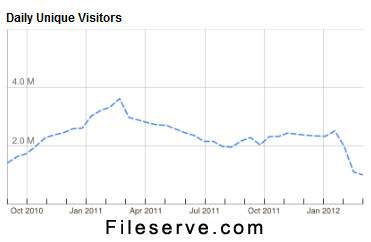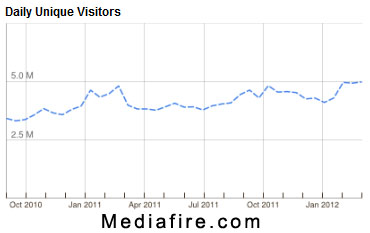TorrentFreak Email Update |
| French ‘Three Strikes’ Law Slashes Piracy, But Fails to Boost Sales Posted: 30 Mar 2012 01:06 PM PDT
A new report from the Hadopi office, conveniently written in English so it can be used by lobbyists all around the world, is claiming the following. “Benchmarking studies covering all of the sources available shows a clear downward trend in illegal P2P downloads. There is no indication that there has been a massive transfer in forms of use to streaming technologies or direct downloads.” The report goes on to cite a variety of statistics ranging from a 29 percent decrease in visits to “pirate” sites in 2011, to a 66 percent drop in illegal file-sharing traffic in France in the same period. Impressive figures indeed, and Hadopi is quick to point out that it’s directly related to their three-strikes law. While we’re not going to dispute the validity of the provided statistics, it is worth pointing out that there’s something missing from the report. Something big. For more than a decade the entertainment industry has claimed that digital piracy is the main cause for the gradual decline in revenues. So if piracy is down massively in France, one would expect that the revenues are soaring, right? But they’re not. If we look at the French music industry we see that overall revenues were down by 3.9 percent in 2011. Likewise, the French movie industry is still going through a rough period with revenues dropping 2.7 percent in 2011. Ironically, an industry insider even blamed online piracy for this drop. To sum it up. in 2011 online piracy was slashed in half according to the Hadopi report, but despite this unprecedented decline the movie and music industries managed to generate less revenue than in 2010. If we follow the logic employed by the anti-piracy lobby during the past decade, this means that piracy is actually boosting sales. But that would be a silly conclusion wouldn’t it? As we’ve said in the past, we think that the entertainment industries are overlooking a very significant third factor – technology. In the music industry, for example, highly profitable CDs are being replaced by less profitable MP3s, subscription services and free streaming services such as YouTube. It wouldn’t be going too far to say that the Internet has revolutionized the music industry. File-sharing is obviously a by-product of this digital revolution, but its effect on revenues has been much overstated. The music industry continues to blame piracy for its troubles, even though digital sales, which directly compete with piracy, are booming. Could it be that the format shift from physical to digital music, and the change in buying habits that came along with it, may explain the decline in revenue more than piracy can? The Hadopi report is suggesting that this may indeed be the case. The worst part is of course that this is not how the anti-piracy lobbyists will use the report. That would kill their business. Instead, they will use the report to show how immensely effective anti-piracy laws can be, lobbying for similarly draconian laws all over the world. Source: French ‘Three Strikes’ Law Slashes Piracy, But Fails to Boost Sales |
| Megaupload Shutdown Inflicts Pleasure & Pain On Cyberlockers Posted: 30 Mar 2012 05:29 AM PDT When Megaupload was suddenly wiped from the world stage in January the cyberlocker market was plunged into chaos. Fear, uncertainty and doubt spread throughout the file-hosting business and millions of users were left without their files and had concerns over where to host others in the future. As outlined in our earlier article, in the immediate days following the shutdown alternative hosting services enjoyed an unprecedented surge in traffic, with some welcoming in hundreds of thousands of extra users. Now, just two months later, it’s clear that some are still doing well but for others including some seriously major players, it’s turned out to be a disaster. The LosersFor Fileserve, the site previously placed 7th place in our list of Top 10 File-Sharing Sites of 2011, the news could hardly be worse. Following a decision to change the way it operates including a temporary ban on 3rd party sharing and removal of its download rewards program, the site has lost more than half its traffic.  The developments in January were also bad for Hong Kong-based Filesonic. After completely stopping 3rd party sharing and killing their affiliate program, traffic went into a a massive nosedive. From a peak of nearly 3 million (data via ) estimated daily visitors the site is now down to around just 750,000.  FileJungle, a relatively recent entry to the storage market, got out of the blocks quickly but it wasn’t to last. From a standing start in 2011 they quickly grew to a peak of 1 million visitors per day, but after banning US users and closing its pay per download rewards program, traffic plunged by up to 90%.  It’s a similar story at UploadStation. This relatively new site also removed US-user access and nuked its affiliate program. Traffic has nose-dived from nearly 1 million users per day to under 250,000. After climbing to more than 700,000 visitors per day, Filepost also changed its way of doing business in January. Its traffic also nose-dived and it now receives less than 400,000 visitors per day. Non-MoversHotfile, placed 8th in 2011, initially enjoyed a 20% boost in traffic to roughly 1.5m daily users, but this surge was short-lived and its levels are now a token few percent lower than before the Mega shutdown. FilesTube, the cyberlocker meta-search engine that was placed 4th in our list last year, has had a neutral Mega-shutdown experience. Traffic levels either side of the event are comparable. The WinnersDepositfiles, a site placed 10th in the world in our 2011 list, has done very well indeed. As can be seen from the graph, since the Mega shutdown the site has more than doubled its traffic. Depostfiles is one of a decreasing group of cyberlocker services that still pays out cash to uploaders when their files are downloaded.  For our 5th placed site last year, RapidShare, the changes since January have been positive. Despite further cracking down on unauthorized sharing, the site’s traffic has grown by roughly a third. Nevertheless, the dizzy traffic heights of 2010 seem a distant dream, one that seems unlikely to return. RapidShare killed their rewards program in June that year over piracy concerns.  In 3rd place last year was US-based MediaFire and this huge site has done rather well since the middle of January and is now pulling in up to a million more visitors every day. The company does not appear to have modified the way it operates and does not offer cash rewards for downloads. It is considered one of the best sites for non-premium users, hence its continued popularity.  The world’s biggest file-sharing site 4shared has enjoyed increases of several hundred thousand visitors per day, despite killing its affiliate program in January. 4Shared’s overall traffic levels have remained fairly stable since October 2011.  Not being in the Top 10 list didn’t affect the positive fortunes of other sites such as Uploaded.to. Despite initially disabling access to United States users, the site has done extremely well and is now pulling in nearly 2 million visitors a day, up from around 600,000.  While the site has reportedly just re-enabled US-user access in recent days, Uploaded.to almost simultaneously killed its PPD (Pay Per Download) affiliate program so it’s possible that the slight dip at the end of the graph is an early sign of traffic being affected. ConclusionWhile it seems clear that the presence of pay per download affiliate programs has the potential to affect traffic to a site, companies such as RapidShare, Mediafire and 4Shared appear to be doing well without them at the moment. That said, many sites are still running programs which pay members when users downloading their files decide to sign up for a premium account. If uploaders can make decent revenue in this way, it may encourage them to keep uploading their files as they did with pay per download models. But of course, these days millions of users are simply using their cyberlocker accounts for personal storage and a sharing between family and friends. Expect the bigger companies to spend time and money attracting more of these customers in the months to come. Source: Megaupload Shutdown Inflicts Pleasure & Pain On Cyberlockers |
| You are subscribed to email updates from TorrentFreak To stop receiving these emails, you may unsubscribe now. | Email delivery powered by Google |
| Google Inc., 20 West Kinzie, Chicago IL USA 60610 | |


 It’s a cheerful day for the copyright industry. In France the controversial “graduated response” law (
It’s a cheerful day for the copyright industry. In France the controversial “graduated response” law (


No comments:
Post a Comment